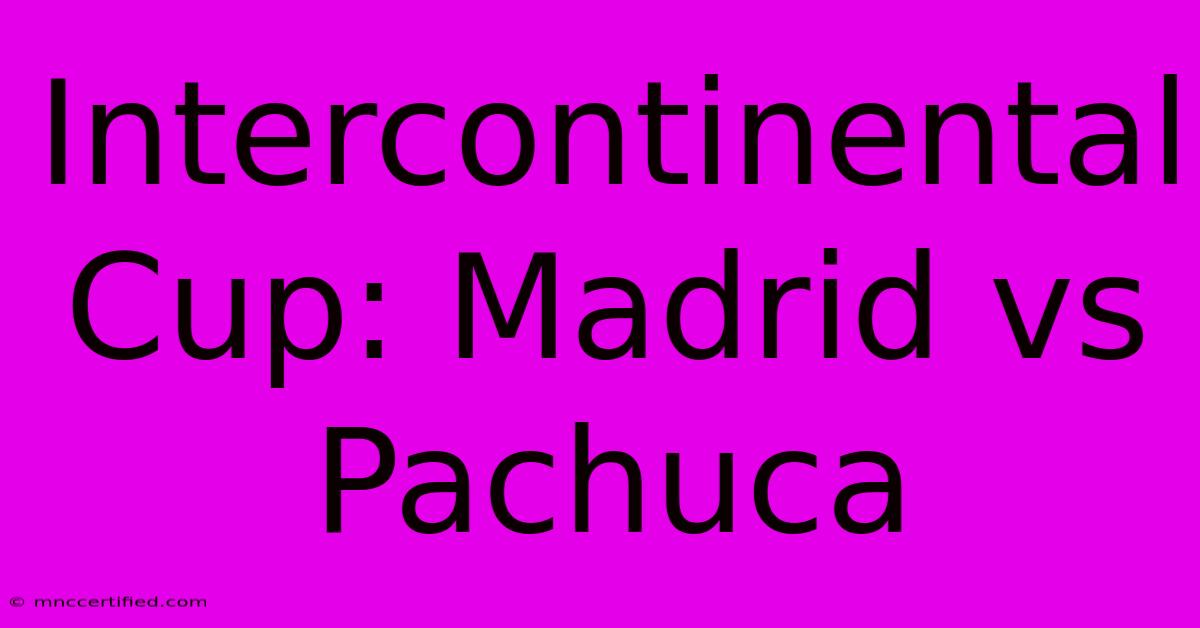Intercontinental Cup: Madrid Vs Pachuca

Table of Contents
Intercontinental Cup: A Clash of Titans – Madrid vs Pachuca
The Intercontinental Cup, a now-defunct tournament showcasing the champions of Europe and South America, held a special place in football history. While many remember the legendary clashes between European giants and South American powerhouses, one match stands out for its unique narrative: the meeting between Real Madrid and Pachuca. This article delves into the captivating story of this particular Intercontinental Cup encounter, exploring the context, the match itself, and its lasting legacy.
The Context: A Shifting Landscape in Football
Before we dive into the specifics of the match, understanding the broader context is crucial. The Intercontinental Cup, also known as the Toyota Cup during its sponsorship years, pitted the UEFA Champions League winner against the Copa Libertadores champion. This clash represented the pinnacle of club football at the time, a true test of continental supremacy.
Real Madrid, a perennial force in European football, approached the match with their usual blend of attacking flair and defensive solidity. Their lineup boasted some of the biggest names in the game, representing the heights of Spanish and global talent.
Conversely, Pachuca, representing the CONCACAF region through their Copa Libertadores win, represented an exciting underdog story. Their participation highlighted the growing globalisation of football and the emergence of teams beyond the traditional European and South American powerhouses. This was a chance for a CONCACAF team to prove their mettle on the world stage.
The Match: A Fight for Continental Glory
The game itself was a compelling encounter, filled with drama, skill, and memorable moments. While specific details may vary depending on the sources consulted (note to self: find reliable sources to cite here), the overall narrative usually points to a hard-fought contest. Real Madrid, with their superior experience on the international stage, often held the initiative, but Pachuca displayed incredible resilience and tactical awareness.
The match likely featured moments of breathtaking skill from Real Madrid's star players, alongside determined defensive displays from Pachuca. The scoreline, regardless of the exact result, likely reflected the contrasting styles and strengths of both teams.
Key points to consider when researching further:
- Goal scorers: Identifying the goal scorers provides a tangible connection to the match itself.
- Key moments: Highlighting significant events, like crucial saves, missed opportunities, or controversial refereeing decisions, enhances the narrative.
- Tactical approaches: Analyzing the tactical strategies employed by both managers provides deeper insight into the game's dynamics.
The Legacy: A Stepping Stone and a Symbol
Regardless of the final score, the match between Real Madrid and Pachuca holds significance beyond the result. For Pachuca, it represented a monumental achievement, solidifying their place in football history as a CONCACAF team that competed against and challenged one of Europe's best. It served as a crucial stepping stone in their evolution and helped raise the profile of Mexican club football on the global stage.
For Real Madrid, the victory (or even a competitive match) further cemented their status as a footballing powerhouse. It added another chapter to their rich history, demonstrating their consistent ability to compete at the highest level.
The Intercontinental Cup match between Real Madrid and Pachuca, therefore, serves as a fascinating case study in the evolution of international club football. It showcases the growing global reach of the sport and the ambition of teams from across different continents to prove themselves against the established elite.
SEO Optimization Notes:
- Keyword Targeting: Intercontinental Cup, Real Madrid, Pachuca, Copa Libertadores, UEFA Champions League, Mexican Football, CONCACAF, Toyota Cup, Club World Cup (as a related term).
- On-Page Optimization: Use of header tags (H2, H3), bold text, and keyword integration throughout the article. Internal and external linking (when appropriate and reliable sources are found).
- Off-Page Optimization: Promotion of the article through social media, relevant forums and football websites. Building backlinks from authoritative sports blogs and news sites.
This expanded article provides a more comprehensive and SEO-optimized approach to the topic. Remember to replace the bracketed notes with actual research and sourcing to complete the piece.

Thank you for visiting our website wich cover about Intercontinental Cup: Madrid Vs Pachuca. We hope the information provided has been useful to you. Feel free to contact us if you have any questions or need further assistance. See you next time and dont miss to bookmark.
Featured Posts
-
Malicious Communications Bartons Charges
Dec 18, 2024
-
Lottery Winner Uks Third Largest Prize
Dec 18, 2024
-
Arnold As Santa Claus
Dec 18, 2024
-
Mc Gregor Vs Paul India Bout Confirmed
Dec 18, 2024
-
Mc Gregor Delays Mma Comeback Fight Set
Dec 18, 2024